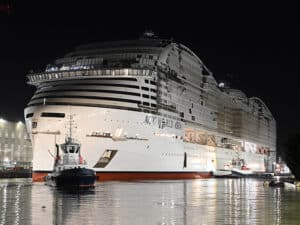
Will Iran close the Strait of Hormuz?
Written by Nick Blenkey
NASA satellite image of Strait of Hormuz
The big question in international shipping today has been whether Iran’s responses to the U.S. Operation Midnight Hammer strikes on its nuclear facilities will include closing the Strait of Hormuz — the only sea passage from the Persian Gulf to the open ocean, making it the primary route for exports from major oil-producing countries in the region.
What are some authoritative sources saying?
This morning the Joint Maritime Information Center (JMIC) noted that while Iran’s Parliament has approved a motion to close the Strait of Hormuz in response to the U.S. strikes, the final decision rests with Iran’s Supreme National Security Council.
In its most recent update JMIC, which assesses that the maritime domain threat level for the Arabian Gulf, Strait of Hormuz and Northern Arabian Sea remains elevated, says that it is “persistently monitoring vessel movements in the region and assesses traffic continues to flow through the Strait of Hormuz.” JMIC adds that it has no indication that commercial maritime activity will be targeted.
- Read the JMIC update HERE
Ambrey threat circular
Maritime risk specialist Ambrey Analytics Ltd. today issued a threat circular with these key points:
- Iran is assessed almost certain to respond militarily to the US strikes on nuclear facilities.
- This is likely to include attacks or seizures of U.S.-affiliated shipping.
- If there is a “closure” of the Strait of Hormuz, this is more likely to be targeted, focused on U.S. and Israeli shipping.
- It is not clear that the U.S/ intervention has ended.
- The Houthis have also vowed to respond.
- There has been some business disruption to merchant shipping.
At the time of writing, says Ambrey, no merchant shipping has been damaged or seized, but the risk to Israel- and U.S.-affiliated shipping is assessed to be high.
Ambrey has noted that five publicly U.S.-affiliated merchant ships departed the Arabian/Persian Gulf since the U.S .military operations. None publicly affiliated with the US appear to have entered since the operations. Ambrey is aware of at least five merchant ships that were destined to enter the Arabian/Persian Gulf but about-turned or chose to wait. At least two of these did not bear a public U.S.-affiliation, indicating broader concern in the market. Several US-flagged merchant ships have gathered in UAE territorial seas.
“Whilst the stated threat to the Strait of Hormuz has been non-specific,” says Ambrey, “it is more likely that if Iran were to declare the Strait closed, it would be to certain affiliations. A complete closure would be to the detriment of Iran’s relations with its neighbors and disruptive to the world’s economy, which would impact its partners. It is assessed unnecessary to do this. There has been no designation of a combat area, which might disrupt shipping at large.’
In the Red Sea and Gulf of Aden, Ambrey assesses that targets have not been available to the Houthis, and this explains the lack of incidents. It is assessed likely that they will resume the targeting of U.S.-affiliated shipping in the region when the opportunity arises
- Read the full Ambrey threat circular and its threat-mitigation recommendations HERE




